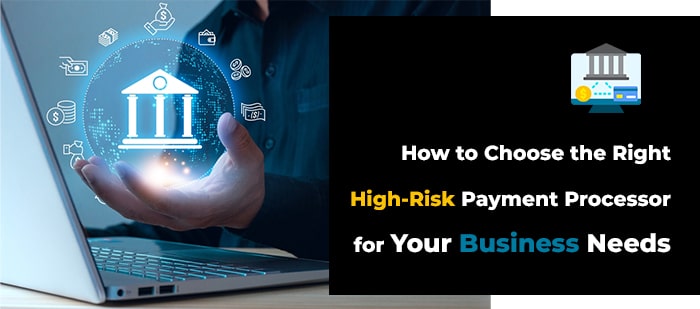How to Choose the Right High-Risk Payment Processor for Your Business Needs
How to Choose the Right High-Risk Payment Processor for Your Business Needs

Grasping the Concept of High-Risk Payment Processors
High-risk payment processors are specialized services designed to cater to businesses deemed high-risk by financial institutions. This classification often applies to industries with higher chargeback rates, regulatory scrutiny, or those handling high-value transactions. Examples of high-risk industries include online gambling, travel services, adult entertainment, and subscription-based services.
These processors offer tailored solutions to manage the unique risks associated with high chargeback rates and fraud. They provide enhanced security features, compliance support, and often more flexible contract terms. Unlike traditional payment processors, high-risk processors are equipped to handle the specific challenges these businesses face, making them essential for certain sectors.
Security is a key focus for high-risk payment processors. They implement advanced fraud prevention tools, encryption, and adhere to industry standards like PCI-DSS to protect both the business and its customers. These security measures are crucial in industries where the likelihood of fraud and chargebacks is significantly higher.
Another important aspect is the level of support provided. High-risk payment processors typically offer more comprehensive customer support services, including 24/7 availability and dedicated account managers. This level of service ensures that businesses can quickly address any issues that may arise, minimizing downtime and potential revenue loss.
Integration capabilities are also vital. High-risk payment processors must seamlessly integrate with a business’s existing systems, such as e-commerce platforms, accounting software, and CRM systems. This ensures that all transactions are processed smoothly and efficiently, without causing disruptions to business operations.
In summary, high-risk payment processors play a crucial role in supporting businesses that face greater financial risks. They offer specialized features, robust security measures, and dedicated support, ensuring that high-risk businesses can operate efficiently and securely.
Some Related Blogs
- How to choose the right business funding option for your high-risk business
- How to comply with PCI DSS regulations
- The Benefits of Using a Payment Processor That Specializes in High-Risk Businesses
- How to Integrate a Payment Gateway Into Your Website or App
Assessing Your Business Requirements
Understanding your business’s specific needs is crucial when choosing a payment gateway. Each industry has distinct risks and requirements. Begin by identifying these risks. Are you processing high-value transactions frequently? Is your industry more susceptible to fraud or chargebacks? Recognizing these elements is essential for guiding your selection process.
Also, consider your transaction volume and business model. Businesses with high transaction volumes require processors that offer robust infrastructure and scalable solutions. Those with unique models, like subscription services, might need features such as recurring billing. Ensuring that the payment processor can support these needs is key to seamless operations.
Look into the type of customer support offered. High-risk businesses often require around-the-clock support and dedicated account managers to promptly address any issues. Evaluate the level of customer service and support options provided to ensure they align with your operational demands.
Additionally, assess the integration capabilities of the payment processor. It should seamlessly integrate with your existing systems, including e-commerce platforms, accounting software, and CRM systems. Efficient integration minimizes disruptions and ensures smooth transaction processing.
Finally, consider the geographic reach of the payment processor. If your business operates internationally, you’ll need a processor that supports multiple currencies and complies with global regulations. This is particularly important for high-risk businesses that often deal with cross-border transactions.
By closely examining your business requirements and ensuring they align with the capabilities of a payment processor, you set the foundation for a successful partnership that can manage the unique risks and demands of your industry.
Key Features to Consider in a Payment Processor
When selecting a high-risk payment processor, several key features should be on your checklist. Security is paramount. Look for processors that offer advanced fraud prevention tools, encryption, and compliance with industry standards such as PCI-DSS. These features not only protect your business but also build trust with your customers.
Integration options and ease of use are also vital. A payment processor should seamlessly integrate with your existing systems, whether it’s your e-commerce platform, accounting software, or CRM. Additionally, a user-friendly interface can save your team time and reduce errors. Opt for processors that offer detailed documentation and support to assist with integration.
Another crucial aspect to consider is the range of payment methods supported. High-risk businesses often need to accommodate diverse customer preferences, including credit cards, e-wallets, and even cryptocurrencies. Offering multiple payment options can enhance customer satisfaction and potentially boost sales.
Customer support is another key feature. High-risk payment processors should provide robust customer service, ideally with 24/7 availability. Quick and efficient support can minimize disruptions and address issues promptly, which is vital for maintaining smooth business operations.
Additionally, consider the scalability of the payment processor. As your business grows, your transaction volumes and requirements may increase. Ensure the processor can scale with your business and handle higher transaction volumes without compromising performance.
Lastly, evaluate the reporting and analytics tools offered by the payment processor. Comprehensive reporting can provide valuable insights into transaction trends, chargeback ratios, and other critical metrics. These insights can help you make informed business decisions and optimize your payment processing strategy.
By focusing on these key features, you can choose a high-risk payment processor that meets your specific needs and supports the long-term success of your business.
Financial Considerations
When evaluating high-risk payment processors, it’s essential to understand their pricing structures and associated fees. High-risk processors often charge higher fees due to the elevated risk involved. These costs can include setup fees, monthly fees, transaction fees, and chargeback fees. Make sure to obtain a detailed breakdown of all potential charges from each provider you are considering.
It’s important to look beyond just the costs. Consider the overall value provided by the processor in terms of features, security, and support. Sometimes, a processor with slightly higher fees may offer superior services that can benefit your business more in the long run. Features like advanced fraud protection, comprehensive customer support, and robust integration capabilities can justify a higher cost if they help maintain smooth operations and reduce risk.
Conducting a cost-benefit analysis is vital in this selection process. Assess how each processor’s offerings align with your business needs and how their fee structures impact your bottom line. Look at the long-term implications of these costs on your financial strategy. This comprehensive evaluation will help you choose a payment processor that not only fits your budget but also supports your business’s stability and growth.
![]()
Email us anytime!
Email customer service 24/7 at info@binarygateways.com
![]()
Call us anytime!
Reach customer care 24/7 at (801) 761-5001
